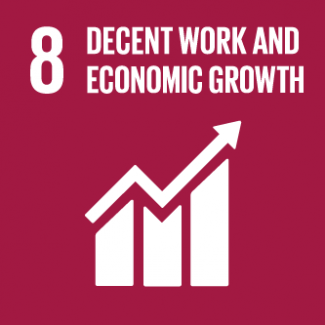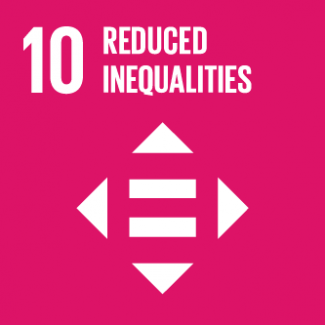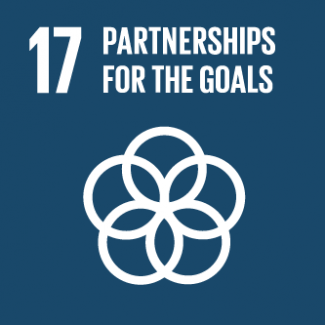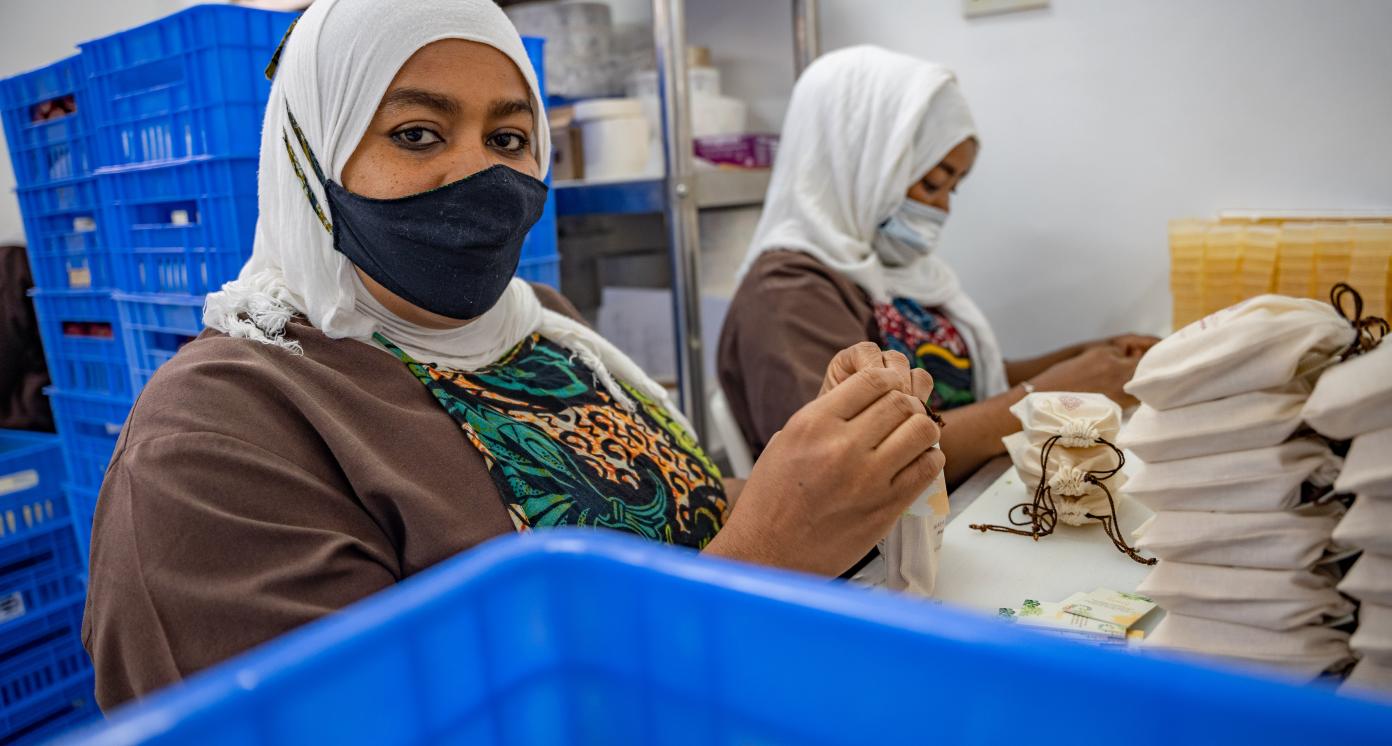Cultural Tourism Offerings



Business Model Description
Create cultural eco-tourism experiences such as tours showcasing traditional ways of the island life and/or develop and operate cultural heritage sites by utilizing the rich traditional culture and the various natural resources of the archipelago. Through a community-private-public partnerships, the private sector invests in tourism assets, the public sector provides the supporting infrastructure and the community provides the land, labour, local expertise and cultural experiences.
Expected Impact
Empower the local community and preserve cultural heritage by expanding employment opportunities, access to resources and higher tourism revenue and promoting longer stays.
How is this information gathered?
Investment opportunities with potential to contribute to sustainable development are based on country-level SDG Investor Maps.
Disclaimer
UNDP, the Private Finance for the SDGs, and their affiliates (collectively “UNDP”) do not seek or solicit investment for programmes, projects, or opportunities described on this site (collectively “Programmes”) or any other Programmes, and nothing on this page should constitute a solicitation for investment. The actors listed on this site are not partners of UNDP, and their inclusion should not be construed as an endorsement or recommendation by UNDP for any relationship or investment.
The descriptions on this page are provided for informational purposes only. Only companies and enterprises that appear under the case study tab have been validated and vetted through UNDP programmes such as the Growth Stage Impact Ventures (GSIV), Business Call to Action (BCtA), or through other UN agencies. Even then, under no circumstances should their appearance on this website be construed as an endorsement for any relationship or investment. UNDP assumes no liability for investment losses directly or indirectly resulting from recommendations made, implied, or inferred by its research. Likewise, UNDP assumes no claim to investment gains directly or indirectly resulting from trading profits, investment management, or advisory fees obtained by following investment recommendations made, implied, or inferred by its research.
Investment involves risk, and all investments should be made with the supervision of a professional investment manager or advisor. The materials on the website are not an offer to sell or a solicitation of an offer to buy any investment, security, or commodity, nor shall any security be offered or sold to any person, in any jurisdiction in which such offer would be unlawful under the securities laws of such jurisdiction.
Country & Regions
- Zanzibar: Pemba
- Zanzibar: Mjini
Sector Classification
Services
Development need
The Tourism and Hospitality sector contributes 28% to GDP and is the source of 82% of the foreign exchange earnings and approx. 60,000 jobs in Zanzibar (1, 10). However, dominated by small to mid-sized hotels and guest houses, the sector lacks development of niche markets and the ability to add value and uniqueness to the visitor experience (2).
Policy priority
The Revolutionary Government of Zanzibar prioritizes building an integrated, inclusive and sustainable tourism sector, promoting high-value tourism for economic empowerment of locals and prevent foreign capital flight (3). Additionally, through its Blue Economy Policy, the government ensures promoting natural and cultural heritages of Zanzibar while preserving them as well (9).
Gender inequalities and marginalization issues
Zanzibar faces higher unemployment for women, wage gap, underemployment, and has fewer women in highly skilled work (4). Almost 48.7% of the total persons in private sector formal employment were directly engaged under Zanzibar’s services sector (5).
Investment opportunities introduction
Before the COVID-19 outbreak, over 500,000 tourists had visited Zanzibar in 2018 and 2019. This indicates a higher possibility by the rising number of foreign visitors. Some of the investment potential in the industry are high-end hotel development, cultural and eco-tourism, halal friendly offerings and marine tourism via private public partnership models (8).
Key bottlenecks introduction
Due to archipelago's nature, sector is very vulnurable to climate change while there is not a common standardization or a sustainable certification of the tourism offerings. Fears over cultural erosion by local communities, ineffective environmental management and leakages of sectoral earning from local economy are some of the key challenges (9).
Hospitality and Recreation
Development need
The number of international visitors reached 394,185 in 2021, showing 51% increase from 2020 (10). This growing demand creates the need to diversify and strengthen the sectoral offerings as there is a lack of competition of niche tourism products, an inadequate promotion of Zanzibar's singularity and a geographical imbalance created by the sector (2).
Policy priority
Zanzibar Tourism Strategic Plan prioritizes facilitating the development and promotion of diversified tourism portfolios such as eco-tourism, sports tourism, cultural tourism, conference tourism and shopping tourism (2). The government encourages private sector on participating in joint financing for MSMEs in tourism sector (7).
Gender inequalities and marginalization issues
Tourism sector operations concentrate mainly on the coastal sides of the islands. This geographical imbalance results in rural populations' isolation from the sector and sectoral opportunities and weak integration among local culture and the lifestyle promoted by the visitors (9).
Investment opportunities introduction
Building or investing in hotels/resorts and facilities for diversified touristic experiences and development of island hopping activities are some of the opportunity areas which would benefit from incentives available for the real estate sector and respond the increasing demand of the sector (8).
Key bottlenecks introduction
Poor standards setting, regulation, monitoring, enforcement, and upgrading for tourism businesses, lack of public-private partnerships, a lack of infrastructure with insufficient capacity to handle combined resident and visitor demands, and poor or absent standards are few of the challenges specific to the tourism sector (2).
Leisure Facilities
Pipeline Opportunity
Cultural Tourism Offerings
Create cultural eco-tourism experiences such as tours showcasing traditional ways of the island life and/or develop and operate cultural heritage sites by utilizing the rich traditional culture and the various natural resources of the archipelago. Through a community-private-public partnerships, the private sector invests in tourism assets, the public sector provides the supporting infrastructure and the community provides the land, labour, local expertise and cultural experiences.
Business Case
Market Size and Environment
< USD 50 million
Between January and February 2022, Zanzibar received 426,633 tourists, showing a 53.1% increase year-on-year (10). In 2019, the 13% of the visitors visit Jozani Forest National Park in Zanzibar, while consumption rate of cultural tourism products was 0.1% (2).
According to Investment Guide of Zanzibar Investment Promotion Authority, average visitor expenditure is 192 USD in Zanzibar (8).
Tourism sector generates over $400 Million in foreign exchange annually (9).
Indicative Return
20% - 25%
According to a feasibility study, Mkomazi Nature Camp within the Mkomazi National Park is expected to generate an IRR of 23%, which is greater than the discounting rate (weighted average cost of capital, WACC) of 13.5% (28).
Investment Timeframe
Medium Term (5–10 years)
Based on the insights from the Mkomazi Nature Camp, similar facilities in Zanzibar could be expected to have a payback period of 3.9 years, which is within the loan tenure period of five years (28).
A Feasibility Study for the International Convention Centre at Nyamanzi for exhibition of local culture and crafts indicates that it takes at least 5 years for the project to break even (12).
Ticket Size
< USD 500,000
Market Risks & Scale Obstacles
Capital - Limited Investor Interest
Business - Supply Chain Constraints
Impact Case
Sustainable Development Need
The limited competition, recreation, and tourism options as well as the inability to increase the value and length of stay for visitors are all due to the site-specific sun, sea, and sand products (2), which are not suffice to travelers who want to engage in a variety of experiences (6).
Over-reliance on a small number of originating markets, with approximately 70% of tourist arrivals from Europe, creates a risk of these key markets to be affected by outside factors, such as an economic downturn or political events (14).
Gender & Marginalisation
High-end tourism revenue does not benefit rural communities as much compared to the dominantly touristic areas where mostly sea, sun and sand tourism is preferred (2).
Expected Development Outcome
Cultural tourism offerings would increase the value-added of the tourism sector, creating an enabling environment for longer stays, while preserving cultural values and accelerate participation and involvement of local population.
By effectively enhancing customer satisfaction and generating value from various tourism products, the development of cultural tourism offerings will improve visitors' experiences in Zanzibar.
Improved and diversified experiences of visitors through cultural tourism will promote and safeguards the island's cultural heritage and increases the number of return visitors as well as customer diversification.
Gender & Marginalisation
Cultural tourism will contribute to the range and value of goods and services provided by local MSMEs, thus will optimise the local value-added contribution by the sector while empowering local community.
Primary SDGs addressed

8.9.1 Tourism direct GDP as a proportion of total GDP and in growth rate
Tourism contributes 28% of Zanzibar's GDP (1).
N/A
Secondary SDGs addressed


Directly impacted stakeholders
People
Gender inequality and/or marginalization
Planet
Corporates
Public sector
Indirectly impacted stakeholders
People
Planet
Corporates
Outcome Risks
The growth of tourists attracted to cultural offerings may increase waste generation and consequently put a strain on local waste management systems (23, 24).
Improper handling of historical sites as well as tourists overcrowding one place can damage supporting infrastructure and hinder the preservation of artefacts and tangible heritage (25).
Increased tourist arrivals can undermine local economy, increasing the cost of living for the domestic population.
Impact Risks
Climatic stressors such as high temperatures, rising sea levels, flooding and drought can diminish the positive impact of cultural tourism (26).
If the traditions of local communities are not considered, thereby undermining the cultural diversity of the region, the business model may fail to reach the necessary level of positive impact (27).
Impact Classification
What
The expansion of cultural tourism offerings preserves Zanzibar's cultural heritage while enhancing and broadening the visitor experience, increasing tourism revenue and repeat visitors.
Who
Local communities that benefit from cultural tourism offerings who will be included to tourism sector while protecting their cultural lifestyle.
Risk
Environmental pressures coupled with the exclusion of local stakeholders from the cultural diversity of the region may limit the impact of cultural tourism on the local population.
Contribution
Cultural tourism offerings contributes to tourist growth and income generation while engaging local community further with tourism sector and improving sectoral value addition.
How Much
Expanding cultural experience for visitors contributes to the targeted tourist arrivals of 800,000 and daily expenditure per tourist increases from USD 192 to USD 420 by 2030 (3).
Impact Thesis
Empower the local community and preserve cultural heritage by expanding employment opportunities, access to resources and higher tourism revenue and promoting longer stays.
Enabling Environment
Policy Environment
Zanzibar Development Vision 2050: Diversification of tourism products, which are compatible with Zanzibar's natural and cultural heritage and have the potential to be profitable to accelerate market expansion, is one of the endeavors of the Vision 2050's economic transition pillar(3).
Zanzibar Blue Economy Policy 2022: One of the main objectives of this policy is to safeguard and promote Zanzibar's cultural and natural heritage while encouraging the adoption of sustainable practices (9).
Zanzibar Tourism Policy, 2018: Policy underlines the need to provide support to Community Based Tourism enterprises to enter the tourism value chain, enabling local communities to develop competitive tourism products and viable businesses (7).
Financial Environment
Fiscal incentives: Aside from available general incentives for international investors such as exemption from payment of import duty, excise duty, VAT (8), a fiscal incentive package is being developed for tourism, including cultural tourism, as part of the “Tourism for All” initiative (29).
Other incentives: 100% foreign ownership, 33 to 99 years of land lease agreement, employment of expatriates in key positions, 100% allowance for R&D activities are some of the other incentives provided by the Government based on the size of the investment (8).
Regulatory Environment
Tourism Act, 2009: The Act provides the institutional framework, administration, regulation, registration and licensing of tourism facilities and activities in Zanzibar (16).
Environmental Management for Sustainable Development Act,1996: The Act binds government to ensure that all public work and workplans should include overall environmental protection and environmentally-sound implementation while ensuring sustainable use of renewable and nonrenewable resources (18).
Marketplace Participants
Private Sector
Zanzibar Association of Tour Investors, Zanzibar Commission for Tourism, Zanzibar Association of Tour Guides, Zanzibar Association of Tour Operators, Zanzibar National Chamber of Commerce, Industry and Agriculture.
Government
Ministry of Tourism and Antiquities, Zanzibar Investment Promotion Authority (ZIPA), Zanzibar Employees' Association. (ZANEMA), Office of the Chief Government Statistician (for exit surveys).
Multilaterals
World Bank.
Non-Profit
SNV-Netherlands Development Organisation, VSO, USAID.
Target Locations
Zanzibar: Pemba
Zanzibar: Mjini
References
- (1) World Bank. 2022. Tanzania Economic Update: Empowering Women - Expanding Access to Assets and Economic Opportunities. https://documents1.worldbank.org/curated/en/099850002282226344/pdf/P174894034150b0080a42e081bd547a37b8.pdf
- (2) World Bank. 2019. Zanzibar Tourism Integrated Strategic Action Plan. https://documents1.worldbank.org/curated/pt/993701565250577192/pdf/Zanzibar-A-Pathway-to-Tourism-for-All-Integrated-Strategic-Action-Plan.pdf
- (3) Zanzibar Planning Commission. 2020. Zanzibar Development Vision 2050. http://planningznz.go.tz/doc/new/ZDV2050.pdf
- (4) UN Women. 2021. Zanzibar's Gender Indicators. https://africa.unwomen.org/sites/default/files/Field%20Office%20Africa/Attachments/Publications/2021/08/Infographics%20-%20Zanzibar%20SDG%20Gender%20Indicators.pdf
- (5) UNECA Sub Regional office for Eastern Africa (SROA-EA). 2022. Zanzibar tourism satellite account : estimating the contribution of tourism to the economy of Zanzibar. https://repository.uneca.org/handle/10855/47591
- (6) Zanzibar Comission for Tourism. 2015. Zanzibar Tourism Strategic Plan. http://www.zanzibartourism.go.tz/images/joomlart/documents/STRATEGIC_PLAN_2015.pdf
- (7) Zanzibar Commission for Tourism. Zanzibar Tourism Policy. https://pdfslide.net/documents/zanzibar-tourism-policy-statementwwwzanzibartourismgotzdocumentszanzibartourismpolicypdfpdf.html?page=1
- (8) Zanzibar Investment Promotion Authority. 2022. Zanzibar Investment Guide with Sector Profile.
- (9) The Revolutionary Government of Zanzibar. 2021. Blue Economy Policy. Available upon request.
- (10) Office of the Chief Government Statistician. 2022. Tourism Statistical Release October - 2022. https://www.ocgs.go.tz/php/ReportOCGS/1673248546.pdf
- (11) Inversor. 2022. https://www.inversor.org.co/en/portafolio-2/waya-guajira/
- (12) Revolutionary Government of Zanzibar, 2020. Feasibility Study for Bundle of PPP projects.
- (13) Revolutionary Government of Zanzibar (RGZ), 2019. Tourism Integrated Strategic Action Plan (TISAP)
- (14) Office of the Chief Government Statistician. 2022. Zanzibar Statistical Abstract, 2021. https://www.ocgs.go.tz/php/ReportOCGS/ZANZIBAR%20STATISTICAL%20ABSTRACT%202021.pdf
- (15) CRM Land Consult Limited. 2019. Micheweni Free Economic Zone Master Plan 2019-2039, Interim Report.
- (16) Revolutionary Government of Zanzibar. 2009. Zanzibar Tourism Act. https://zanzibarassembly.go.tz/document/the-zanzibar-tourism-act-no-6/
- (17)Revolutionary Government of Zanzibar. 1995. Hotel Levy Act. https://www.zanrevenue.org/resources/view/the-hotel-levy-act-no.1-of-1995-revised-edition-of-2016
- (18) Revolutionary Government of zanzibar. 1996. Environmental Management for Sustainable Development Act. http://www.rttz.org/wp-content/uploads/2013/11/environmental-management-for-sustainable-development-act-19961.pdf
- (19) Zanzibar Planning Commission. 2021. Zanzibar Development Plan.
- (20) Lonely Planet. 2023. Kidike Flying Fox Sanctuary. https://www.lonelyplanet.com/tanzania/zanzibar-archipelago/pemba/attractions/kidike-flying-fox-sanctuary/a/poi-sig/1440864/355667
- (21) Colors of Zanzibar. 2023. https://www.colorsofzanzibar.com/
- (22) Eco&Culture Tours Zanzibar. 2023. https://www.ecoculture-zanzibar.com/
- (23) A. M. Martins, S. Cró. 2021. The Impact of Tourism on Solid Waste Generation and Management Cost in Madeira Island for the Period 1996–2018. https://mdpi-res.com/d_attachment/sustainability/sustainability-13-05238/article_deploy/sustainability-13-05238-v2.pdf?version=1620625459
- (24) Sustainable Travel International. 2020. Tackle Waste & Pollution. https://sustainabletravel.org/our-work/waste-pollution/
- (25) Forbes. 2019. 5 Destinations Suffering From Overtourism (And Where To Go Instead). https://www.forbes.com/sites/geoffwhitmore/2019/11/19/5-destinations-suffering-from-overtourism-and-where-to-go-instead/?sh=5ba5282341ca
- (26) D. Chikodzi, G. Nhamo et al. 2022. Climate change risk assessment of heritage tourism sites within South African national parks. https://www.sciencedirect.com/science/article/pii/S2577444122000533
- (27) Iranomad Tours. 2019. Impact of Tourism on Local Community. https://nomad.tours/ecoutourism-iran/11638/impact-of-tourism-on-local-community/
- (28) Jadian Company Limited, 2021. Feasibility Study Report. Available upon request.
- (29) UNDP Stakeholder Consultations. 2022.















